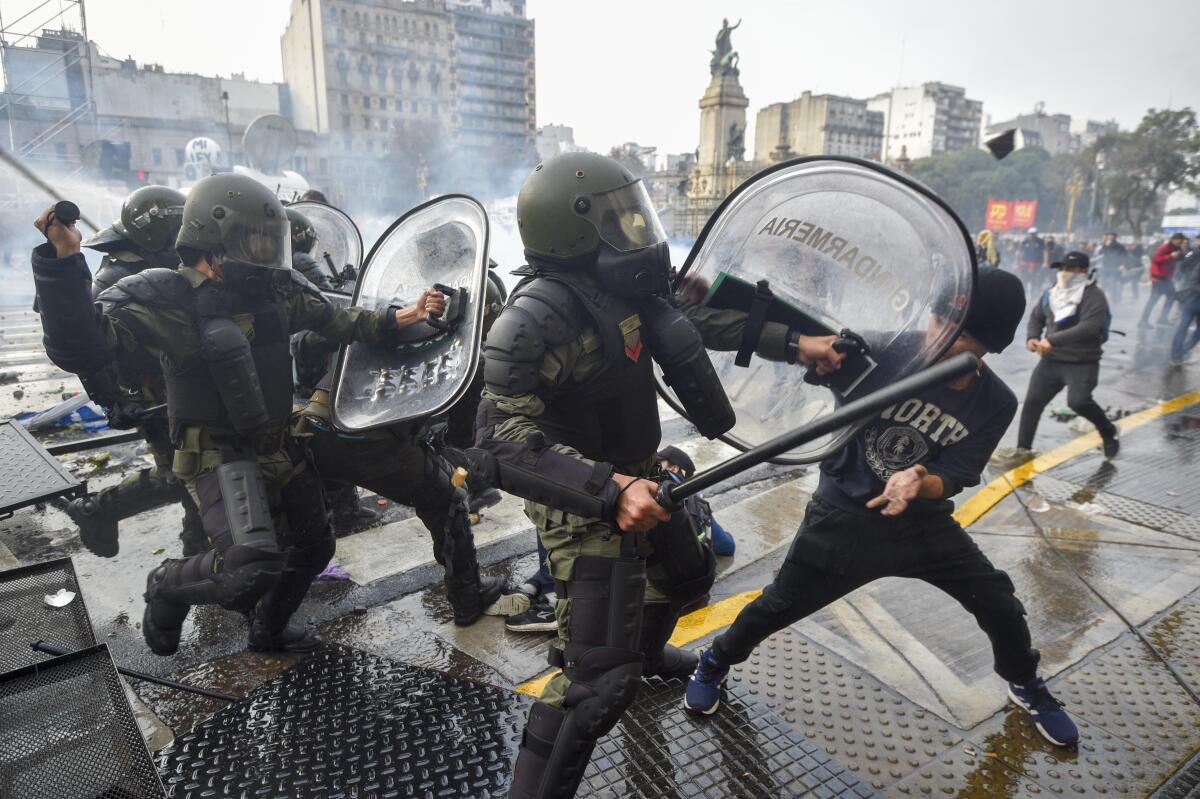Riot police in Argentina disperse protesters with water cannons, tear gas ahead of key Senate vote

BUENOS AIRES, Argentina — Argentine riot police fired water cannons and tear gas to disperse protesters who threw stones and Molotov cocktails outside Congress on Wednesday, escalating tensions before lawmakers were to vote on state overhaul and tax bills proposed by President Javier Milei.
The vote is the most serious test to date of the libertarian leader’s vision of governance and change.
Thousands of demonstrators had converged around Congress as Senate opened debate on the key legislation, urging lawmakers to reject Milei’s program of harsh austerity and economic deregulation.
The carnival atmosphere that prevailed in downtown Buenos Aires earlier in the day — with protesters playing trumpets, grilling meat on impromptu barbecues and chanting raucously — quickly turned as crowds jostled and shoved against the column of police armed with shields and batons.
Argentina says that it had cut 15,000 state jobs as part of President Javier Milei’s aggressive campaign to slash spending.
Security forces backed by armored cars with mounted water cannons pushed back protesters who surged toward cordoned-off streets. Facing resistance from protesters who threw Molotov cocktails and stones, and set fire to at least one vehicle, hundreds of police officers unleashed water canons and tear gas.
There were no immediate reports of arrests or injuries in the ensuing scuffles. Earlier in the day, police had used pepper spray to clear a line of protesters, sending at least four opposition lawmakers to the hospital, according to their political party Unión por la Patria.
The violence outside Congress prompted a shouting match inside as opposition senators tried to pass a motion to pause the debate because of the clashes. The motion failed and debate continued.
Milei rose to power on the promise he would solve Argentina’s worst economic crisis in two decades, but his political party of relative novices holds a tiny minority of seats in Congress and he has struggled to strike deals with the opposition.
Argentina’s next president, Javier Milei, is a culture-warring Trump fan who opposes abortion, calls the pope an “imbecile” and says sex education is a Marxist plot.
Senators began debating two bills on Wednesday, a tax package that lowers the income tax threshold and a 238-article state reform bill, initially dubbed the “omnibus bill” because of its then more than 600 articles.
This watered-down version still delegates broad legislative powers to the president in energy, pensions and security, and includes measures to incentivize investment, deregulate the economy and trim the deficit.
Certain touchy subjects, such as unions’ provision of health care and the privatization of Argentina’s national oil company, have been scrapped in hopes of reaching a compromise.
“If this law passes, we are going to lose so many of our labor and pension rights,” said 54-year-old primary school teacher Miriam Rajovitcher, saying already her school budget has been slashed, her wages have been cut and food prices have skyrocketed. “Already I am so much worse off.”
Argentina’s President-elect Javier Milei has shown public interest in Judaism, incorporating shofars at campaign rallies and visiting a rabbi’s tomb.
Chanting, “Our country is not for sale!” protesters held signs mocking Milei for his self-proclaimed “anarcho-capitalist” agenda and drastic efforts to slash spending across the state. “How can a head of state hate the state?” one read.
After weeks of torturous negotiations to win over potential allies, Milei’s two major bills cleared an important hurdle in late April, passing the lower house of Congress. If the Senate passes the bills with modifications, the lower house still has to approve them.
During the debate Wednesday, pro-Milei senators said they had accepted tough concessions.
Argentine President Javier Milei has gone further in his support of Israeli Prime Minister Benjamin Netanyahu’s government than perhaps any other world leader.
“Today, it’s almost more important for Milei to demonstrate that he can pass laws in Congress than what he passes,” said Lucas Romero, director of Synopsis consultancy.
The package faces stiff resistance from right-wing moderates and the left-leaning Peronist movement loyal to former president Cristina Fernández de Kirchner, which has dominated Argentine politics for two decades.
The Peronist bloc controls 33 out of 72 seats in the Senate while Milei’s party, Freedom Advances, holds just seven. The bill needs 37 votes in the Senate to get a majority.
Analysts say foreign investors and the International Monetary Fund, to which Argentina owes a staggering $44 billion, are closely watching the vote to see whether Milei can build consensus with his opponents to deliver on his ambitions.
Debre writes for the Associated Press.
More to Read
Sign up for Essential California
The most important California stories and recommendations in your inbox every morning.
You may occasionally receive promotional content from the Los Angeles Times.













